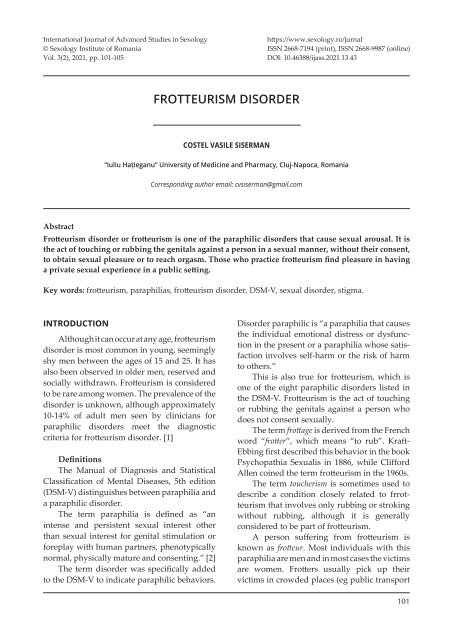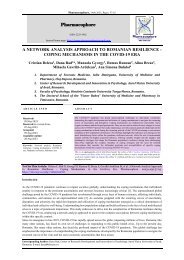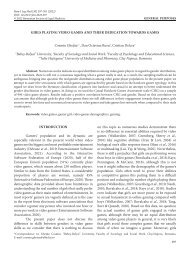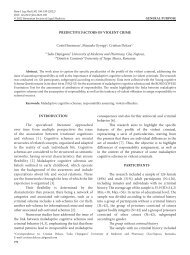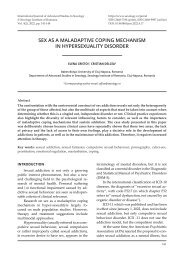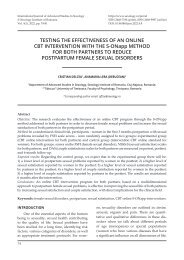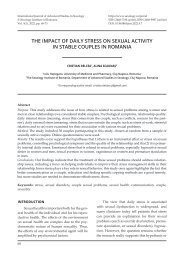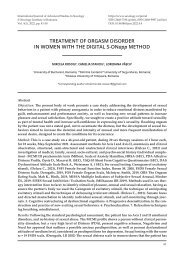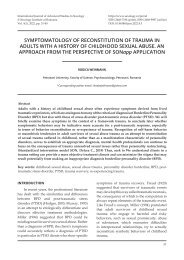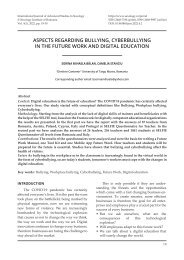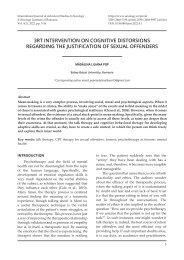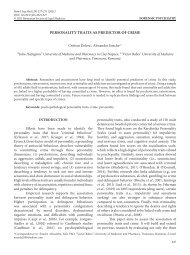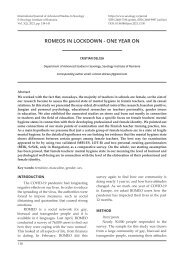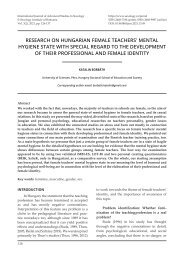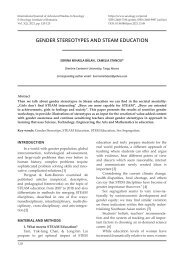Frotteurism disorder
Frotteurism disorder or frotteurism is one of the paraphilic disorders that cause sexual arousal. It is the act of touching or rubbing the genitals against a person in a sexual manner, without their consent, to obtain sexual pleasure or to reach orgasm. Those who practice frotteurism find pleasure in having a private sexual experience in a public setting. Keywords: frotteurism, paraphilias, frotteurism disorder, DSM-V, sexual disorder, stigma.
Frotteurism disorder or frotteurism is one of the paraphilic disorders that cause sexual arousal. It is the act of touching or rubbing the genitals against a person in a sexual manner, without their consent, to obtain sexual pleasure or to reach orgasm. Those who practice frotteurism find pleasure in having a private sexual experience in a public setting.
Keywords: frotteurism, paraphilias, frotteurism disorder, DSM-V, sexual disorder, stigma.
You also want an ePaper? Increase the reach of your titles
YUMPU automatically turns print PDFs into web optimized ePapers that Google loves.
International Journal of Advanced Studies in Sexology<br />
© Sexology Institute of Romania<br />
Vol. 3(2), 2021, pp. 101-105<br />
https://www.sexology.ro/jurnal<br />
ISSN 2668-7194 (print), ISSN 2668-9987 (online)<br />
DOI: 10.46388/ijass.2021.13.43<br />
FROTTEURISM DISORDER<br />
COSTEL VASILE SISERMAN<br />
“Iuliu Hațieganu” University of Medicine and Pharmacy, Cluj-Napoca, Romania<br />
Corresponding author email: cvsiserman@gmail.com<br />
Abstract<br />
<strong>Frotteurism</strong> <strong>disorder</strong> or frotteurism is one of the paraphilic <strong>disorder</strong>s that cause sexual arousal. It is<br />
the act of touching or rubbing the genitals against a person in a sexual manner, without their consent,<br />
to obtain sexual pleasure or to reach orgasm. Those who practice frotteurism find pleasure in having<br />
a private sexual experience in a public setting.<br />
Key words: frotteurism, paraphilias, frotteurism <strong>disorder</strong>, DSM-V, sexual <strong>disorder</strong>, stigma.<br />
INTRODUCTION<br />
Although it can occur at any age, frotteurism<br />
<strong>disorder</strong> is most common in young, seemingly<br />
shy men between the ages of 15 and 25. It has<br />
also been observed in older men, reserved and<br />
socially withdrawn. <strong>Frotteurism</strong> is considered<br />
to be rare among women. The prevalence of the<br />
<strong>disorder</strong> is unknown, although approximately<br />
10-14% of adult men seen by clinicians for<br />
paraphilic <strong>disorder</strong>s meet the diagnostic<br />
criteria for frotteurism <strong>disorder</strong>. [1]<br />
Definitions<br />
The Manual of Diagnosis and Statistical<br />
Classification of Mental Diseases, 5th edition<br />
(DSM-V) distinguishes between paraphilia and<br />
a paraphilic <strong>disorder</strong>.<br />
The term paraphilia is defined as “an<br />
intense and persistent sexual interest other<br />
than sexual interest for genital stimulation or<br />
foreplay with human partners, phenotypically<br />
normal, physically mature and consenting.” [2]<br />
The term <strong>disorder</strong> was specifically added<br />
to the DSM-V to indicate paraphilic behaviors.<br />
Disorder paraphilic is “a paraphilia that causes<br />
the individual emotional distress or dysfunction<br />
in the present or a paraphilia whose satisfaction<br />
involves self-harm or the risk of harm<br />
to others.”<br />
This is also true for frotteurism, which is<br />
one of the eight paraphilic <strong>disorder</strong>s listed in<br />
the DSM-V. <strong>Frotteurism</strong> is the act of touching<br />
or rubbing the genitals against a person who<br />
does not consent sexually.<br />
The term frottage is derived from the French<br />
word “frotter”, which means “to rub”. Kraft-<br />
Ebbing first described this behavior in the book<br />
Psychopathia Sexualis in 1886, while Clifford<br />
Allen coined the term frotteurism in the 1960s.<br />
The term toucherism is sometimes used to<br />
describe a condition closely related to frrotteurism<br />
that involves only rubbing or stroking<br />
without rubbing, although it is generally<br />
considered to be part of frotteurism.<br />
A person suffering from frotteurism is<br />
known as frotteur. Most individuals with this<br />
paraphilia are men and in most cases the victims<br />
are women. Frotters usually pick up their<br />
victims in crowded places (eg public transport<br />
101
COSTEL VASILE SISERMAN<br />
vehicles, crowded sidewalks), which allows<br />
for quick escape and excuse that the touch was<br />
accidental. The frotteur rubs his genital area<br />
against the victim’s thighs or buttocks (usually<br />
female) or the frotteur caresses a woman’s<br />
genitals or breasts with his hands. [3]<br />
Etiology<br />
The exact etiology is not known, but there<br />
are many theories about the cause of frotteurism<br />
<strong>disorder</strong>. Psychoanalysts suggest that<br />
individuals with frotteuristic behaviors may<br />
have unmet needs to rub against the victim<br />
and cuddle, as an infant does with his mother.<br />
People who engage in these behaviors may<br />
imagine that they share an exclusive and close<br />
relationship with their victims during the act.<br />
Freund and Seto argue that these individuals<br />
may also have problems with tactile interactions<br />
that may occur during normal human<br />
erotic or sexual interactions. [4]<br />
There has been some research that has<br />
shown the existence of a biological mechanism,<br />
mainly through monoamine neurotransmitters<br />
that lead to abnormal sexual behavior. [5]<br />
Although not specific to frotteurism, paraphilias<br />
have generally been associated with the<br />
following additional mental health diagnoses:<br />
[6]<br />
- social anxiety;<br />
- brain injuries;<br />
- the history of sexual abuse, in general, was<br />
associated with a paraphilic <strong>disorder</strong>;<br />
- intellectual disabilities;<br />
- substance abuse;<br />
- the presence of others or an accumulation of<br />
paraphilias, in particular exhibitionism and<br />
frotteurism.<br />
Diagnosis and prevalence<br />
According to DSM-5, the criteria for frotteurism<br />
<strong>disorder</strong> are met if for a period of 6<br />
months a person has experienced intense sexual<br />
arousal and repeated that involves touching<br />
and rubbing a person who does not consent,<br />
characterized by fantasies, sexual impulses or<br />
specific behaviors. In some cases, people with<br />
frotteurism <strong>disorder</strong> reach orgasm during<br />
intercourse. <strong>Frotteurism</strong> <strong>disorder</strong> is sometimes<br />
accompanied by other mental health <strong>disorder</strong>s<br />
and clinical problems, especially along with<br />
other paraphilic <strong>disorder</strong>s, such as exhibitionism<br />
or other combinations of paraphilic<br />
<strong>disorder</strong>s. People with frotteurism may also<br />
experience anxiety, shame, low self-image,<br />
and other emotional problems that exacerbate<br />
behavior and complicate treatment.<br />
The prevalence rate of frotteurism is not<br />
yet clearly established, as it is assumed that<br />
most people with this condition do not seek<br />
professional help voluntarily. It is difficult to<br />
assess the prevalence of frotteurism because<br />
the studies either do not have the necessary<br />
methodological quality or include small<br />
sample sizes or use local rather than national<br />
or international samples and do not consistently<br />
apply DSM criteria. The prevalence rate<br />
of frotteurism can also be uncertain because,<br />
in most cases, victims are unaware that they<br />
have been touched or rarely report incidents to<br />
the authorities. <strong>Frotteurism</strong> is a predominantly<br />
male <strong>disorder</strong> and usually occurs for the first<br />
time in late adolescence and decreases until<br />
the age of 25 years. It has been estimated that<br />
30% of adult men have engaged in frotteuristic<br />
acts, and 10% to 14% of men diagnosed with<br />
paraphilic <strong>disorder</strong>s also meet the diagnostic<br />
criteria for frotteurism <strong>disorder</strong>. Data on the<br />
prevalence of female diagnoses of frotteurism<br />
<strong>disorder</strong> are not available. [7]<br />
Assesment<br />
An essential feature of the frotteurism<br />
<strong>disorder</strong> is that this behavior is repetitive.<br />
According to DSM-V, if the individual<br />
did not act in his interest and did not present<br />
mental discomfort or dysfunctions, it is considered<br />
that has a frotteuristic sexual interest, but<br />
not a frotteurism <strong>disorder</strong>.<br />
As part of establishing the diagnosis and<br />
excluding other causes, routine laboratory and<br />
imaging tests can be obtained.<br />
Laboratory work may include:<br />
- metabolic panel;<br />
- hormonal tests: tests of thyroid function,<br />
prolactin, luteinizing and folliculostimulating<br />
hormone test, testosterone tests.<br />
If additional deviant sexual behaviors<br />
are suspected, nocturnal penile tumescence<br />
102
<strong>Frotteurism</strong> <strong>disorder</strong><br />
may be considered along with brain scans, as<br />
indicated.<br />
Some important points to consider that can<br />
help get a diagnosis:<br />
1. The most common form of behavior is<br />
the rubbing of an individual’s genitals against<br />
the victim’s thighs or buttocks;<br />
2. The act usually takes place in a wide<br />
variety of crowded public settings, such as<br />
public transport, subways, elevators, malls or<br />
other crowded places;<br />
3. Behaviors are usually repetitive.<br />
Most cases are not reported. Frotters<br />
often do not face legal consequences (rarely<br />
arrested), have a large base of casualties and<br />
are unlikely to be sentenced to long sentences.<br />
However, there are no systematic studies to<br />
support these findings.<br />
The initiators of frotteuristic behaviors<br />
do not seek to have any conversation with<br />
the victim and are often surprised if they are<br />
“caught”.<br />
Causes and risk factors<br />
There are no scientifically proven causes or<br />
risk factors for this <strong>disorder</strong>. At the same time,<br />
there are several theories. [8]<br />
A person who has accidentally rubbed<br />
against someone in a crowd and, as a result<br />
of rubbing, has been sexually aroused may<br />
want to repeat this experience. This episode<br />
could replace more traditional means of sexual<br />
arousal.<br />
Childhood trauma, such as sexual abuse<br />
or anxiety <strong>disorder</strong>, can prevent a person from<br />
developing a normal psychosexual development.<br />
People with this <strong>disorder</strong> may feel<br />
contact with a stranger as a form of foreplay<br />
and intimacy.<br />
Another possible reason for this behavior<br />
is that a person may have problems with the<br />
affectivity and intimacy of sexual behavior.<br />
This could be caused by the abnormal anatomy<br />
of the brain that affects the emotional health<br />
and the control of the impulses.<br />
The signs of paraphilia are often evident<br />
before adolescence. Someone who is very<br />
concerned about sex may have a higher risk of<br />
rubbing.<br />
Treatment<br />
People with frotteurism <strong>disorder</strong> generally<br />
do not receive treatment on their own and<br />
receive help only after they have been arrested<br />
for sexual assault and treatment is required by<br />
the courts. And because those with frotteuristic<br />
tendencies tend to act quickly in crowded<br />
public places and are often able to disappear or<br />
mingle in a crowd without being caught, there<br />
is little reliable information on the prevalence<br />
or success rates of treatment. Because the literature<br />
on this topic is rare, treatment modalities<br />
are often generalized for all paraphilic<br />
<strong>disorder</strong>s.<br />
Standard treatments for frotteurism<br />
<strong>disorder</strong> include medication and psychotherapy.<br />
Medications such as hormones and<br />
certain antidepressants can be used to reduce<br />
sexual desire. Behavioral or cognitive-behavioral<br />
therapy can help manage sexual needs and<br />
redirect thoughts to more appropriate ways<br />
to control inappropriate sexual impulses and<br />
behaviors. In many cases, people requesting<br />
a diagnosis have already been charged with a<br />
sex offense or similar offense.<br />
Psychotherapy focuses on identification<br />
triggers of frotteuristic behavior and the development<br />
of strategies to redirect thoughts and<br />
feelings.<br />
A multimodal approach is recommended,<br />
ie one that includes individual and family<br />
or community participation, in addition to<br />
psychotherapeutic and pharmacological<br />
interventions.<br />
Several different therapeutic models,<br />
including psychotherapy, cognitive behavioral<br />
therapy, solution-oriented therapy, psychoanalysis,<br />
relaxation therapy, biofeedback, have<br />
been explored with a certain success. In addition,<br />
the clinician must be aware of his counter-transfer<br />
during this process.<br />
As mentioned earlier, frotteuristic behavior<br />
has been associated with several other mental<br />
health <strong>disorder</strong>s, such as depression, anxiety,<br />
and low self-esteem. [9] Therefore, treatment<br />
often also involves the treatment of the underlying<br />
or comorbid <strong>disorder</strong>. Regarding pharmacological<br />
interventions, can be administered<br />
both drugs that “suppress” the sexual drive, ie<br />
103
COSTEL VASILE SISERMAN<br />
suppresses testosterone, as well as drugs that<br />
“reduce” the sexual drive, such as serotonergic<br />
antidepressants. Administration of medroxyprogesterone<br />
acetate, a female hormone, can<br />
also help reduce sexual impulses.<br />
Anti-androgens, especially GnRH<br />
analogues, have been used as evidence-based<br />
treatment to reduce impulsivity and hypersexuality<br />
in severe cases. [10]<br />
Ethical challenges that require informed<br />
consent before administering GnRH analogues<br />
must be addressed. In addition, because<br />
impulsive hypersexuality is considered to be<br />
a factor in this <strong>disorder</strong>, certain serotonergic<br />
antidepressants, such as Fluoxetine, Sertraline,<br />
and Paroxetine, have been modestly successful<br />
in attenuating the increase in sexual drive in<br />
people who may also have comorbid conditions<br />
such as depression or obsessive-compulsive<br />
<strong>disorder</strong> (OCD). [11]<br />
Differential diagnosis<br />
Substance abuse <strong>disorder</strong>: An intoxicated<br />
person who uses psychostimulants such as<br />
methamphetamine or cocaine may experience<br />
an episode that may mimic frotteurism. If such<br />
recurrent episodes continue, a diagnosis of<br />
frotteurism <strong>disorder</strong> may be considered in the<br />
absence of acute substance poisoning.<br />
Traumatic brain injury: Frontal and frontotemporal<br />
deficiencies resulting from traumatic<br />
brain injury may show a similar lack of inhibition<br />
and increased sexual behaviors. However,<br />
cognitive impairments are usually present as a<br />
result of brain damage.<br />
Conduct <strong>disorder</strong> and antisocial personality<br />
<strong>disorder</strong>: lack of morality, non-compliance with<br />
the law and social norms can be important<br />
to distinguish a <strong>disorder</strong> of frotteurism. The<br />
distinction is centered on the lack of sexual<br />
interest or arousal by touching or rubbing a<br />
person who does not consent by someone with<br />
such a <strong>disorder</strong>.<br />
Other differential diagnoses may include:<br />
Obsessive-Compulsive Disorders<br />
Mood Disorders<br />
Other <strong>disorder</strong>s of sexual dysfunction<br />
Other paraphilic <strong>disorder</strong>s<br />
Forecast<br />
Because this is an under-studied <strong>disorder</strong>,<br />
the actual prognosis is unknown. Very few<br />
cases are self-reported, and most offenders<br />
are discovered through legal proceedings.<br />
Large-scale studies or long-term studies based<br />
on reliable results are absent in this area. As a<br />
significant component of treatment is based on<br />
self-reporting and the individual’s willingness<br />
to seek help, it is safe to assume that motivated<br />
individuals, with good community support<br />
and active involvement in the treatment, may<br />
have a better prognosis than those who do not<br />
are.<br />
Complications<br />
Very little is known about the long-term<br />
impact of frotteurism on the initiator or the<br />
victim.<br />
If comorbid conditions are taken into<br />
account, this can lead to the development of<br />
a frotteurism <strong>disorder</strong>, which can cause significant<br />
damage to the individual clinically or<br />
functionally. These individuals may have low<br />
self-esteem, severe social anxiety, and feelings<br />
of guilt. Untreated mental health conditions<br />
can cause a further decline in mental health.<br />
Once time “caught”, stigma from society and<br />
obedience of rules, as well as the application<br />
of additional legal penalties, may occur. For<br />
those with severe sexual <strong>disorder</strong>s, mandatory<br />
registration in the register of sex offenders,<br />
regular “check-ins” with the legal system or<br />
restrictions when it comes to the access to the<br />
real estate market can further complicate the<br />
picture.<br />
This can be similar to a traumatic experience<br />
for the victim - increased anxiety,<br />
hypervigilance, avoidance of public transport,<br />
insecurity and a general feeling of distrust.<br />
Discouraging and educating the patient<br />
There is no drug treatment approved by<br />
major international agencies for frotteuristic<br />
behaviors. People should be educated and<br />
encouraged to seek psychotherapeutic interventions<br />
and medications when necessary. It is<br />
important to inform the patient that the management<br />
of underlying or comorbid conditions<br />
104
<strong>Frotteurism</strong> <strong>disorder</strong><br />
also helps to improve this <strong>disorder</strong>. The stigmatization<br />
of the patient is a real problem<br />
that must be recognized and addressed by the<br />
clinician.<br />
CONCLUSION<br />
<strong>Frotteurism</strong> <strong>disorder</strong> can be successfully<br />
treated, although not everyone affected by<br />
this paraphilic <strong>disorder</strong> can be completely<br />
cured. <strong>Frotteurism</strong> is considered to be in<br />
complete remission if five years pass without<br />
another manifested episode or an uncontrolled<br />
impulse. Many people with this condition do<br />
not think they have a problem, so it is important<br />
that friends or family members form<br />
a support network to keep them on track.<br />
Ongoing therapy with a therapist or mental<br />
health counselor may also be necessary, but a<br />
forensic psychiatrist is best able to assess, diagnose,<br />
and manage the treatment of people with<br />
frotteurism, thus improving their outcomes,<br />
and reducing thus, future sex crimes.<br />
BIBLIOGRAPHY<br />
1. <strong>Frotteurism</strong>. SexInfoOnline. University of<br />
California, Santa Barbara. Updated 3 Apr 2014.<br />
2. DSM-5. Manual de Diagnostic si Clasificare<br />
Statistica a Tulburarilor Mintale. pg. 691-694.<br />
American Psychiatric Association (2013). Editura<br />
Callistro.<br />
3. Dr. Vincent Berger. Web publication.<br />
Psychologist Anywhere Anytime. https://<br />
www.psychologistanywhereanytime.co m/<br />
sexual_problems_pyschologist/psychologist_<br />
frotteurism.htm<br />
4. Freund K, Seto MC. Preferential rape in the<br />
theory of courtship <strong>disorder</strong>. Arch Sex Behav.<br />
1998 Oct;27(5):433-43.<br />
5. Kamenskov MY, Gurina OI. [Neurotransmitter<br />
mechanisms of paraphilic <strong>disorder</strong>s]. Zh Nevrol<br />
Psikhiatr Im S S Korsakova. 2019;119(8):61-67.<br />
6. Abel GG, Becker JV, Cunningham- Rathner J,<br />
Mittelman M, Rouleau JL. Multiple paraphilic<br />
diagnoses among sex offenders. Bull Am Acad<br />
Psychiatry Law. 1988;16(2):153-68.<br />
7. Mark Griffiths, PhD. Wordpress. Rubbing<br />
someone up the wrong way: A beginner’s guide<br />
to frotteurism.<br />
8. James Roland, Janet Brito, Ph.D., LCSW, CST.<br />
October 26, 2017. Article. What Is <strong>Frotteurism</strong>?<br />
https://www.healthline.com/health/frotteuri sm.<br />
9. Kalra G. The depressive façade in a case of<br />
compulsive sex behavior with frottage. Indian J<br />
Psychiatry. 2013 Apr;55(2):183-5.<br />
10. Garcia FD, Thibaut F. Current concepts in the<br />
pharmacotherapy of paraphilias. Drugs. 2011<br />
Apr 16;71(6):771-90.<br />
11. Kafka MP, Prentky R. Fluoxetine treatment of<br />
nonparaphilic sexual addictions and paraphilias<br />
in men. J Clin Psychiatry. 1992 Oct;53(10):351-8.<br />
12. Delcea C., Siserman C., 2020: Validation and<br />
Standardization of the Questionnaire for<br />
Evaluation of Paraphilic Disorders. Rom J Leg<br />
Med28(1)14-20(2020) DOI:10.4323/rjlm.2020.14<br />
Romanian Society of Legal Medicine<br />
13. Siserman C., Delcea C., Vladi Matei H., Vică L. M.<br />
2019: Major Affective Distres in Testing Forensic<br />
Paternity. 2019. - Rom J Leg Med27(3)292-<br />
296(2019) DOI:10.4323/rjlm.2019.292 ©<br />
Romanian Society of Legal Medicine.<br />
14. Delcea C., Rusu O. D., Matei V. H., Vica M. L.,<br />
Siserman C., (2020). The Evidence-Based Practice<br />
Paradigm Applied to Judicial Psychological<br />
Assessment In The Context of Forensic Medicine.<br />
Rom J Leg Med [28] 257-262 [2020] DOI: 10.4323/<br />
rjlm.2020.257.<br />
15. Siserman C., Giredea C., Delcea C., (2020). The<br />
Comorbidity of Paraphilic Disorders and Rape<br />
In Individuals Incarcerated For Sexual Offences.<br />
Rom J Leg Med [28] 278-282 [2020] DOI: 10.4323/<br />
rjlm.2020.278.<br />
105


